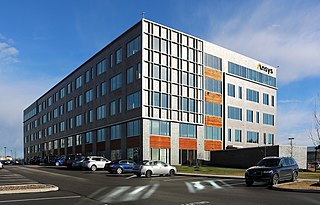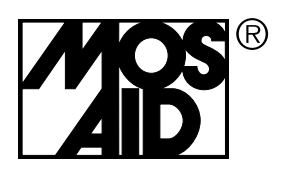
Cypress Semiconductor Corporation was an American semiconductor design and manufacturing company. It offered NOR flash memories, F-RAM and SRAM Traveo microcontrollers, PSoCs, PMICs, capacitive touch-sensing controllers, Wireless BLE Bluetooth Low-Energy and USB connectivity solutions.
Teradyne, Inc. is an American automatic test equipment (ATE) designer and manufacturer based in North Reading, Massachusetts. Its high-profile customers include Samsung, Qualcomm, Intel, Analog Devices, Texas Instruments and IBM.

A mixed-signal integrated circuit is any integrated circuit that has both analog circuits and digital circuits on a single semiconductor die. Their usage has grown dramatically with the increased use of cell phones, telecommunications, portable electronics, and automobiles with electronics and digital sensors.
General Instrument (GI) was an American electronics manufacturer based in Horsham, Pennsylvania, specializing in semiconductors and cable television equipment. They formed in New York City in 1923 as an electronics manufacturer. During the 1950s, the company began a series of acquisitions under the direction of Moses Shapiro. Among the more notable purchases was General Transistor in 1960, which led to GI becoming a major producer of transistors, and later, integrated circuits (ICs). By the late 1960s, the company was mostly depending on sales into the television industry, which was further bolstered by the 1967 purchase of Jerrold Electronics.

Ansys, Inc. is an American multinational company with its headquarters based in Canonsburg, Pennsylvania. It develops and markets CAE/multiphysics engineering simulation software for product design, testing and operation and offers its products and services to customers worldwide.
Advantest Corporation (株式会社アドバンテスト) is a Japanese leading manufacturer of automatic test equipment (ATE) for the semiconductor industry, and a manufacturer of measuring instruments used in the design, production and maintenance of electronic systems including fiber optic and wireless communications equipment and digital consumer products. Based in Tokyo, Advantest produces Memory, SoC and RF test systems.
KLA Corporation is an American capital equipment company based in Milpitas, California. It supplies process control and yield management systems for the semiconductor industry and other related nanoelectronics industries. The company's products and services are intended for all phases of wafer, reticle, integrated circuit (IC) and packaging production, from research and development to final volume manufacturing.
Maxim Integrated Products, Inc., was an American semiconductor company that designed, manufactured, and sold analog and mixed-signal integrated circuits for the automotive, industrial, communications, consumer, and computing markets. Maxim's product portfolio included power and battery management ICs, sensors, analog ICs, interface ICs, communications solutions, digital ICs, embedded security, and microcontrollers. The company is headquartered in San Jose, California, and has design centers, manufacturing facilities, and sales offices worldwide. In 2021, the company was acquired by Analog Devices.

Xcerra Corporation was an American semiconductor Automatic Test Equipment (ATE) vendor, founded in 1976 in (co-founder) Sol Max's basement, later moving to the Balco building in Newton & GTE building 3 in Needham, then the KLH building on University Ave. in Westwood and currently headquartered on University Ave. in Norwood, Massachusetts.
Microchip Technology Incorporated is a publicly listed American corporation that manufactures microcontroller, mixed-signal, analog, and Flash-IP integrated circuits. Its products include microcontrollers, Serial EEPROM devices, Serial SRAM devices, embedded security devices, radio frequency (RF) devices, thermal, power, and battery management analog devices, as well as linear, interface and wireless products.
RF Micro Devices, was an American company that designed and manufactured high-performance radio frequency systems for applications that drive wireless and broadband communications. Headquartered in Greensboro, North Carolina, RFMD traded on the NASDAQ under the symbol RFMD. The Company was founded in Greensboro, North Carolina, in 1991. RF Micro had 3500 employees, 1500 of them in Guilford County, North Carolina.

Verigy Ltd was a Cupertino, California-based semiconductor automatic test equipment manufacturer. The company existed as a business within Hewlett-Packard before it was spun off in 2006 as a standalone company. It was purchased by Advantest in 2011.
Eagle Test Systems is a supplier of automatic test equipment (ATE) and operates as a business unit within the Teradyne Semiconductor Test Division. Eagle's test equipment was designed to address volume production. Customers, including semiconductor manufacturers and assembly and test subcontractors, use the products to test analog, a combination of digital and analog, known as mixed-signal, and radio frequency (RF) semiconductors.
Virata Corporation is an inactive acquired company that was a major contributor to the "Cambridge Phenomenon" or Silicon Fen high-tech cluster in the United Kingdom. Case studies and research papers have been created to illustrate the role of social networking in the creation of Virata's success. There is also research available on the role the company played in Silicon Valley venture networks.

Virage Logic corporation was an American provider of both functional and physical semiconductor intellectual property (IP) for the design of complex integrated circuits. It was founded in 1996. The company's differentiated product portfolio included processor centric solutions, interface IP solutions, embedded SRAMs and NVMs, embedded memory test and repair, logic libraries, and memory development software.

pSemi, is a San Diego–based manufacturer of high-performance RF CMOS integrated circuits. A Murata Manufacturing company since December 2014, the company's products are used in aerospace and defense, broadband, industrial, mobile wireless device, test and measurement equipment and wireless infrastructure markets. Their UltraCMOS technology is a proprietary implementation of silicon on sapphire (SOS) and silicon on insulator (SOI) substrates that enables high levels of monolithic integration.

Keithley Instruments is a measurement and instrument company headquartered in Solon, Ohio, that develops, manufactures, markets, and sells data acquisition products, as well as complete systems for high-volume production and assembly testing.
GCA Corporation was a multinational investment bank headquartered in San Francisco, United States. It was sold to Houlihan Lokey in October 2021.
Silicon Motion Technology Corporation, stylized as SiliconMotion, is an American-Taiwanese company involved in developing NAND flash controller integrated circuits (ICs) for solid-state storage devices. The company has claimed to have supplied more NAND flash controllers than any other company, over five billion from 2006 through 2016. They are found in commercial, enterprise, and industrial applications ranging from SSDs, eMMCs, memory cards, and USB flash drives.

MOSAID is a semiconductor technology company incorporated in Ottawa, Canada. It was founded in 1975 as a DRAM design company, and later branched out into other areas including EDA software, semiconductor reverse engineering, test equipment manufacturing and intellectual property licensing. MOSAID went public in 1994 with a listing on the Toronto Stock Exchange under ticker symbol "MSD". By 2011 the business was based exclusively on patent licensing and the company was acquired by Sterling Partners, a US-based private equity firm. MOSAID was renamed Conversant Intellectual Property Management in 2013. In 2021, the company announced it was changing its name back to MOSAID.







